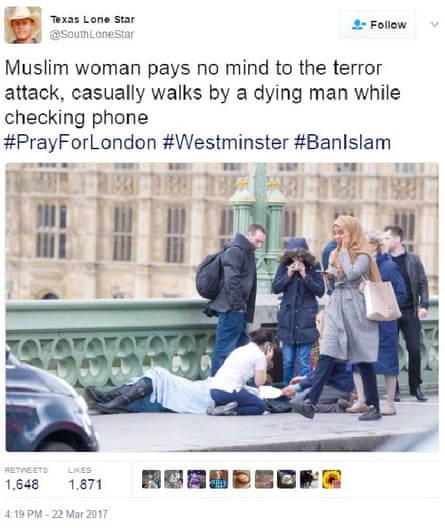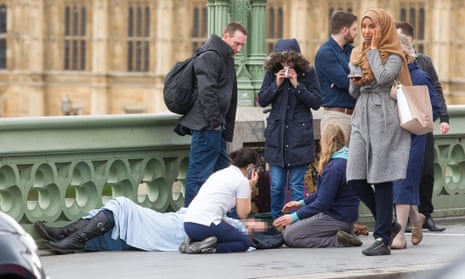Concern about Russian influence in British politics has intensified as it emerged that more than 400 fake Twitter accounts believed to be run from St Petersburg published posts about Brexit.
Researchers at the University of Edinburgh identified 419 accounts operating from the Russian Internet Research Agency (IRA) attempting to influence UK politics out of 2,752 accounts suspended by Twitter in the US.
One of the accounts run from the Kremlin-linked operation attempted to stir anti-Islamic sentiment during the Westminster Bridge terror attack in March in a bogus post claiming a Muslim woman ignored victims – a claim that was highlighted by mainstream media outlets including Mail Online and the Sun.
For days after, the tweeter was gleefully sharing press clippings. “Wow … I’m on the Daily Mail front page! Thank you British libs! You’re making me famous,” he said, referring to an article that appeared on Mail Online and which still bore the tweet at the time of writing.

A day later, he tweeted: “I’m on The Sun! Thank you again, British libs! Now I’m even more famous!”
Damian Collins, the chairman of the Commons culture, media and sport select committee, which is investigating fake news, said the Russian agency appeared to be attempting to divide society and destabilise politics.
The Conservative MP wants Twitter to tell the committee how it believes Russia has been attempting to influence UK politics.
“What is at stake is whether Russia has constructed an architecture which means they have thousands of accounts with which they can bombard [us] with fake news and hyper-partisan content,” he said.
“We need to understand how widespread it is and what the impact is on the democratic process.”
Collins has demanded that Twitter’s chief executive, Jack Dorsey, supply examples of posts from the Internet Research Agency about British politics – citing concern at possible “interference by foreign actors in the democratic process” of the UK.
“This is information they hold and I can’t see any reason they should be delaying supplying it,” he said.
The developments come after the US Congress intelligence committee investigated Russian troll campaigning in the US election of November 2016.
Twitter told the House committee that it had suspended 2,752 accounts which were tweeting about the US election because it believed they were controlled from Russia. The committee said it “may well be just the tip of the iceberg”.
Hundreds of paid bloggers work round the clock at the IRA to flood Russian internet forums, social networks and the comments sections of western publications – sowing disinformation, praising the country’s president, Vladimir Putin, and raging at the west.
The agency has been linked to a businessman who was once Putin’s favourite chef.
Prof Laura Cram, director of neuropolitics research at the University of Edinburgh, told the Guardian that at least 419 of those accounts tweeted about Brexit a total of 3,468 times – mostly after the referendum had taken place.
Archives of the now deleted Russian accounts show they included people purporting to be a US Navy veteran, a Tennessee Republican and a Texan patriot – all tweeting in favour of Brexit.
Labour deputy leader Tom Watson urged Theresa May to “bring political pressure to bear on tech giants to reveal the extent to which their platforms have been hijacked, and to take action against agents of the Russian state who use their platforms to disseminate misinformation and untruths”.
He said tech companies including Twitter and Facebook “haven’t done enough to identify and weed out the fake profiles and automated content that pose a direct threat to our democracy”.
On Monday, May gave a speech in which she said Russia’s actions were “threatening the international order on which we all depend”.
She accused Russia of meddling in elections and planting fake stories in the media to “weaponise information” and sow discord in the west.
Concerns about Russia’s cyber-operations have also been raised elsewhere in Europe.
Spain’s prime minister, Mariano Rajoy, claimed on Monday that half of the Twitter accounts that amplified the issue of Catalan independence were registered in Russia and 30% in Venezuela.
Others have voiced concerns that Russian social media accounts also sought to influence this year’s French and German elections.
A spokesperson for Twitter said the company “recognises that the integrity of the election process itself is integral to the health of a democracy. As such, we will continue to support formal investigations by government authorities into election interference as required.”
The Russian tweets identified by Twitter as coming from the IRA included one by an account holder using the name @SouthLoneStar.
He reportedly said: “I hope UK after #BrexitVote will start to clean their land from muslim invasion!” and “UK voted to leave future European Caliphate! #BrexitVote.”
The same account posted a widely shared tweet at the time of the March terror attack on Westminster Bridge in London.
It posted a photograph of a woman in a headscarf passing the scene of the attack with the caption: “Muslim woman pays no mind to the terror attack, casually walks by a dying man while checking phone #PrayForLondon #Westminster #BanIslam.”
The woman said later: “Not only have I been devastated by witnessing the aftermath of a shocking and numbing terror attack, I’ve also had to deal with the shock of finding my picture plastered all over social media by those who could not look beyond my attire, who draw conclusions based on hate and xenophobia.”
Another suspended account appeared to be a Republican from Tennessee. @TEN_GOP quoted Nigel Farage telling Fox News about Brexit and Donald Trump: “What you’ve seen this year is just ordinary, decent people, the little people, who’ve said ‘We’ve had enough. We want change.’”
@WadeHarriot, purporting to be a former member of the US Navy, retweeted criticisms of “leftists” for “trying to subvert #Brexit” and predictions of “#Brexit #Frexit #Grexit”.
Cram said the content of the Brexit tweets overall was “quite chaotic and it seems to be aimed at wider disruption. There’s not an absolutely clear thrust. We pick up a lot on refugees and immigration.”
She stressed that more research is needed to establish the extent of the tweets’ influence, and urged caution about drawing conclusions from the relatively small number of troll accounts so far identified. About 78% of the tweets came after the Brexit vote on 23 June 2016, she added.
Russia has been adamant it did not interfere in any way in the EU referendum. “We closely followed the voting but never interfered or sought to influence it,” Putin said the day after the poll.
However, there is no doubt that many in Moscow welcomed the outcome. An EU without Britain would be less united on sanctions against Russia, many Russian officials hoped, because it would lose one of its stronger foreign policy voices and would be too consumed with its own internal problems to prioritise Russia policy.
At the time, the former US ambassador to Russia, Michael McFaul, said the vote to leave the EU was “a giant victory for Putin’s foreign policy objectives”.
The US Congressional investigation into Russian meddling through social media also gathered evidence from Facebook that between June 2015-August 2017 there were 470 accounts on the platform associated with the IRA and that 126 million Americans are likely to have seen content from an IRA page.









